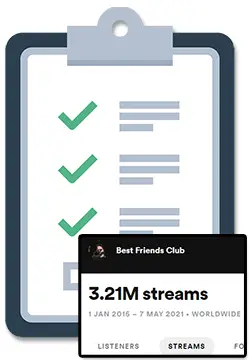Songwriting and the act of finishing a song is a beautiful art form, but it can be frustrating when you hit a creative block and struggle to finish your songs.
In this article, I’ll share 15 tips to help you finish more songs easily based on what I’ve learned releasing over 100 songs on the internet (between platforms like YouTube, MySpace, and modern streaming services like Spotify and Apple Music).
As Best Friends Club, I released 52 songs in 2020 (that’s one per week) and have committed to releasing a new song on Spotify every month since 2021.
Here are 15 tips I’ve learned that have helped me release music super fast:
- Focus on quantity (to get to quality)
- Use templates & repeatable systems
- Set goals and deadlines
- Commit to public release dates
- Schedule time for writing and producing
- Work on multiple ideas at once
- Keep practicing
- Keep honing your skills
- Start with a clear idea
- Collaborate with others
- Study other songwriters
- Get feedback
- Stay inspired
- Don’t be too hard on yourself
- Take breaks (or work on something else)
Let’s take a look at each of these 15 steps in more detail, my friend. 🙂
1. Focus on quantity (to get to quality)
The more songs you write, the more opportunities you have to improve and the more chances you have to come up with something truly special.
If you focus on writing 1 song, you will be someone who can write a song. If you focus on writing lots of songs, you will become a songwriter.
The first 50 – 100 songs you write will likely be duds anyways, so get them out of the way as soon as possible.
2. Use templates & repeatable systems
In a general sense, a template is a pre-designed or pre-formatted document, file, or page that serves as a starting point for creating a new document or file.
In music production, a template can be a pre-made set of tracks, effects, structures, or settings that you use as a starting point for creating a new song.
By working towards having a standard song structure, bass sound, drum patterns/sounds, and instruments that you use whenever starting a song, you’ll be able to focus more on creating music rather than fussing with the technical side of things.
It took a bit of time, but I’ve been able to put templates that together to create a “song-finishing system” that I can follow each time I want to create music without having to worry about structure, drum patterns, or sound design.
3. Set goals and deadlines
Setting realistic goals and deadlines can help you stay on track and avoid procrastination. It can be as simple as setting a goal to write one verse or chorus every day, or a deadline to finish a song in a week or a month.
When I first started out, I challenged myself to write, finish and release a new song every single week for 52 weeks straight (aka 1 year).
By the end of the challenge, I got much faster at finishing songs, started developing my sound, and was able to complete music without needing to wait for inspiration to strike or for writer’s block to end.
4. Commit to public release dates
In addition to the obvious benefit of starting to build a fanbase and grow your music career, by committing to publicly releasing your music you can:
- Get unbiased feedback on how you can improve your music
- Be held accountable for finishing more music
- Stay motivated to finish your music since you know that others are waiting for you to release it
I’ve publically committed to releasing a new song every single month, and it’s been absolutely massive in terms of growing my music career and making sure that I have no way out of writing and releasing more music.
It can definitely be hard, but I’ve found that over time writing and releasing music at this frequency starts to become second nature in the same way that going to the gym every day can become second nature once you’ve been committed long enough.
5. Schedule time for writing and producing
Set aside dedicated time for writing: Schedule a regular time for writing and make it a priority.
Personally, I’ve found that setting aside a 30-minute block each day is enough for me to be able to stay consistent without totally throwing off my life’s schedule.
6. Work on multiple ideas at once
This can be one that is taken the wrong way so please let me clarify, my friend:
The idea here is to briefly (and quickly) work on a handful of song ideas first and then take your best ideas to actually push to the finish line.
Looking to the past, this is similar to how rock bands back in the day would come into the studio with 20+ demos that they would then distill down into 8 – 12 songs that end up on the record.
If you get stuck on one song, you can switch to another and come back to it later. You just need to remember to be disciplined and actually take your best ideas and finish them.
Personally, what I do is come up with 5 ideas or loops. Once I’ve hit 5, I’ll listen back to them and force myself to finish 2 or 3.
It’s interesting how some of the ideas that you were in love with when creating, can turn out to NOT be the songs you end up finishing once you’ve taken some time away from them and can compare them to other ideas you’ve created.
7. Keep practicing
Songwriting, like any other skill, requires practice. Make sure you set aside time every day or every week to practice writing and finishing songs.
Just like how you likely weren’t great at your first instrument and it took time to develop the right skills, you likely won’t start a great songwriting and will need to develop your songwriting skills.
8. Keep honing your skills
Once you reach a certain level of musicianship, it can be tempting to stop practising your instruments and simply focus on writing and finishing complete songs.
It’s important to take on a mindset of “always be learning”. Improvements to your musicianship can lead to big improvements in your songwriting.
I’ve found that the main thing with songwriting is that it’s a battle against yourself to get the idea in your head out onto record. The more skilled you are at your craft, the more easily you’ll be able to get your ideas out correctly.
9. Start with a clear idea
Before starting a song, make sure you have a clear idea of what you want to express or the story you want to tell. It can be a melody, a chord progression, or a lyric. Having a clear idea can help you stay focused and motivated throughout the process.
I’ve found that using a reference track can be a massive help in staying on track to finishing songs. You’ll be using your own ideas and sounds, so don’t worry about this feeling like “copying” or anything like that.
In the same way, having a clear idea of what label you might want to release the song on or what other songs you can imagine hearing the song beside in a DJ set or at a concert can help big time.
10. Collaborate with others
Collaborating with other musicians and songwriters can help you get fresh ideas and perspectives on your work. It can also help you learn new techniques and approaches to songwriting.
11. Study other songwriters
Listen to other songwriters and study their techniques to learn new approaches to songwriting. This can look like taking notes on song structures as well as common sounds and instruments used.
I’ve found this to be particularly important whenever I want to start writing in a new genre or style as this is a great way to quickly understand a style of music and make sure that you honour the genre’s history.
12. Get feedback
Feedback can be a valuable tool for improving your songwriting skills. Ask other musicians, songwriters, or music producers to listen to your work and give you constructive feedback.
I’ve also found it helpful to keep an eye on the number of likes, comments, views or streams on a track as a way to gather “quanitative” data in addition to the “qualitative” you might get from others.
13. Stay inspired
Inspiration can come from anywhere, so make sure you stay open to new ideas and experiences. Listen to different genres of music, read books, watch movies, or take a walk in nature. You never know what might inspire your next song.
14. Don’t be too hard on yourself
It’s important to remember that not every song you write will be a masterpiece. Don’t be too hard on yourself if a song doesn’t turn out the way you expected. Keep writing, and you’ll eventually get better.
15. Take breaks (or work on something else)
Take breaks when you need them to avoid burnout and come back to your work with fresh eyes, fresh ears, and a fresh mind.
If you’re feeling particularlly productive, remember that a break doesn’t need to mean going to watch Netflix or playing a video game.
You can also take breaks by working on something else in your music career wether it be practising your instrument for fun, working on some music marketing tasks, or simply working on a different song.




